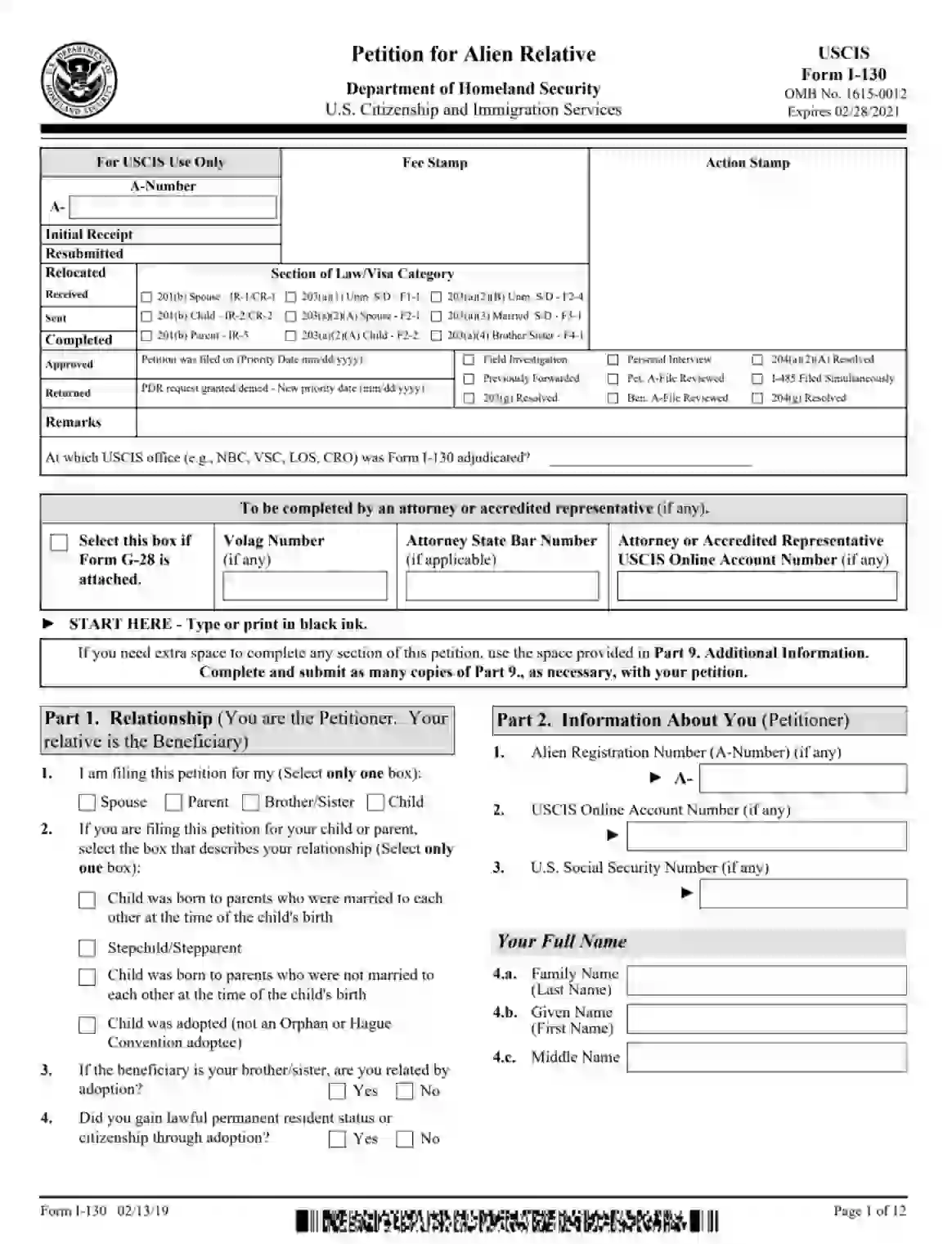USCIS Form I-130, officially titled “Petition for Alien Relative,” is a document used by U.S. citizens or lawful permanent residents to establish a familial relationship with certain alien relatives who wish to immigrate to the United States. This form is the first step in the process of helping a relative become a permanent resident of the U.S., commonly known as obtaining a Green Card. The form serves as a formal request to the U.S. Citizenship and Immigration Services (USCIS) to recognize the relationship and consider the relative for eligibility under U.S. immigration laws.
The I-130 form is essential for family-based immigration, which allows U.S. citizens and permanent residents to sponsor their spouses, parents, children, and siblings. The petitioner must provide substantial evidence of a qualifying relationship, such as marriage certificates for spouses or birth certificates for children and parents. Filing this petition is only the initial phase; the relative must still go through additional steps, including visa applications and interviews, depending on their current location and specific circumstances. Successfully processing Form I-130 is a critical component in reuniting families and enabling relatives to legally live and work in the United States.
Other USCIS Forms
Look through some related IRS forms that wage earners and self-employed individuals might find useful.
Filling Out the Form I-130
The Petition for Alien Relatives I-130 Form contains 12 pages and includes comprehensive information about the petitioner, the beneficiary person, and many other factors. Therefore the paperwork might seem a little intimidating. We recommend using our advanced software to tailor a relevant PDF file. We empower you to follow our comprehensive, illustrated guide to fill out the documents effortlessly.
- Create an I-130 PDF File
The first section of the paperwork comprises data filled out by the USCIS representatives. Skip this section.
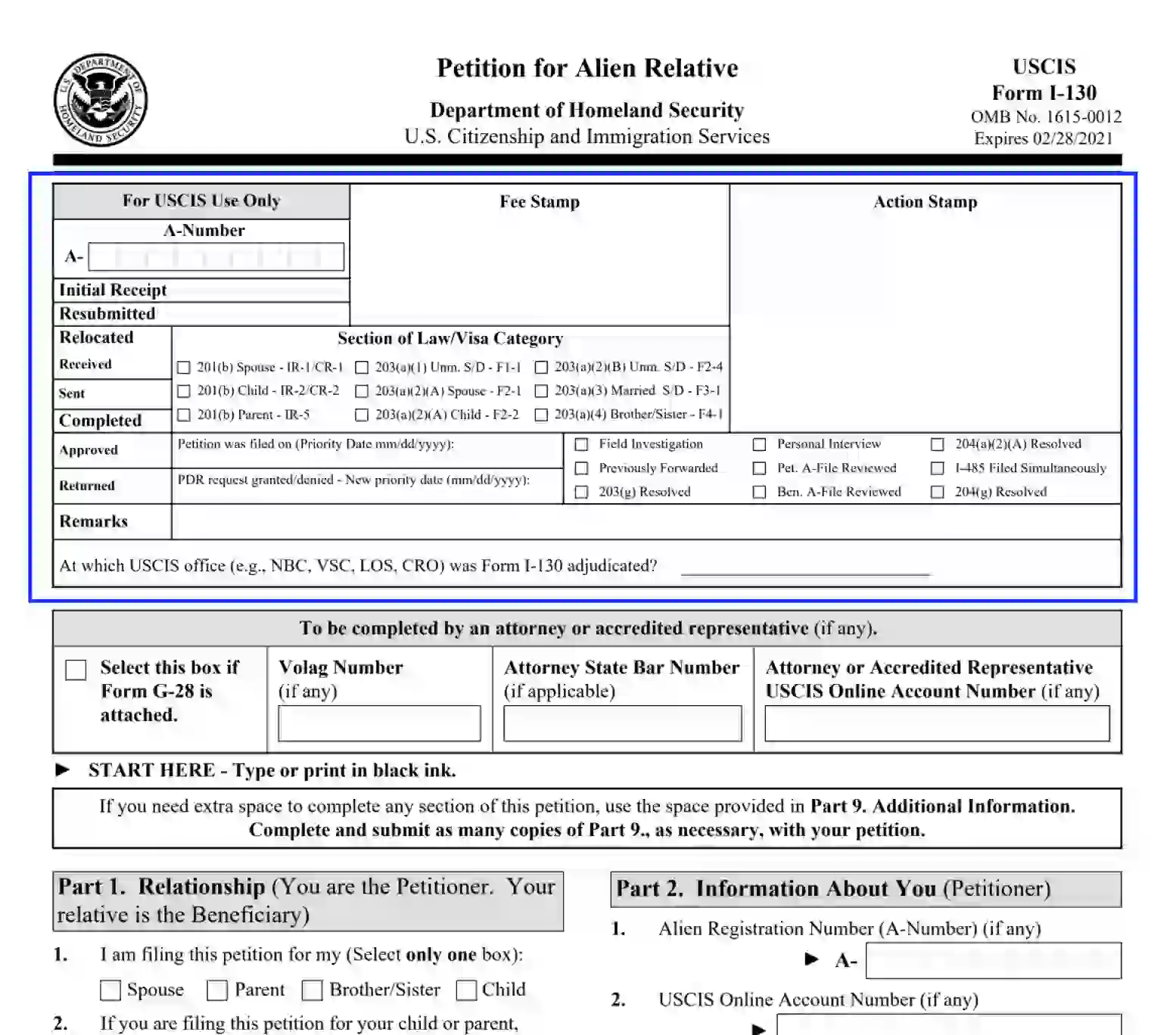
The form contains a specification section accomplished by a legal representative. If you have someone who will complete the form on your behalf, let this person fill the unit.

If both afore-mentioned sections don’t apply to your situation, skip to the “Start here” sector and proceed to complete the I-130 form. Make sure you fill in the info in black ink.
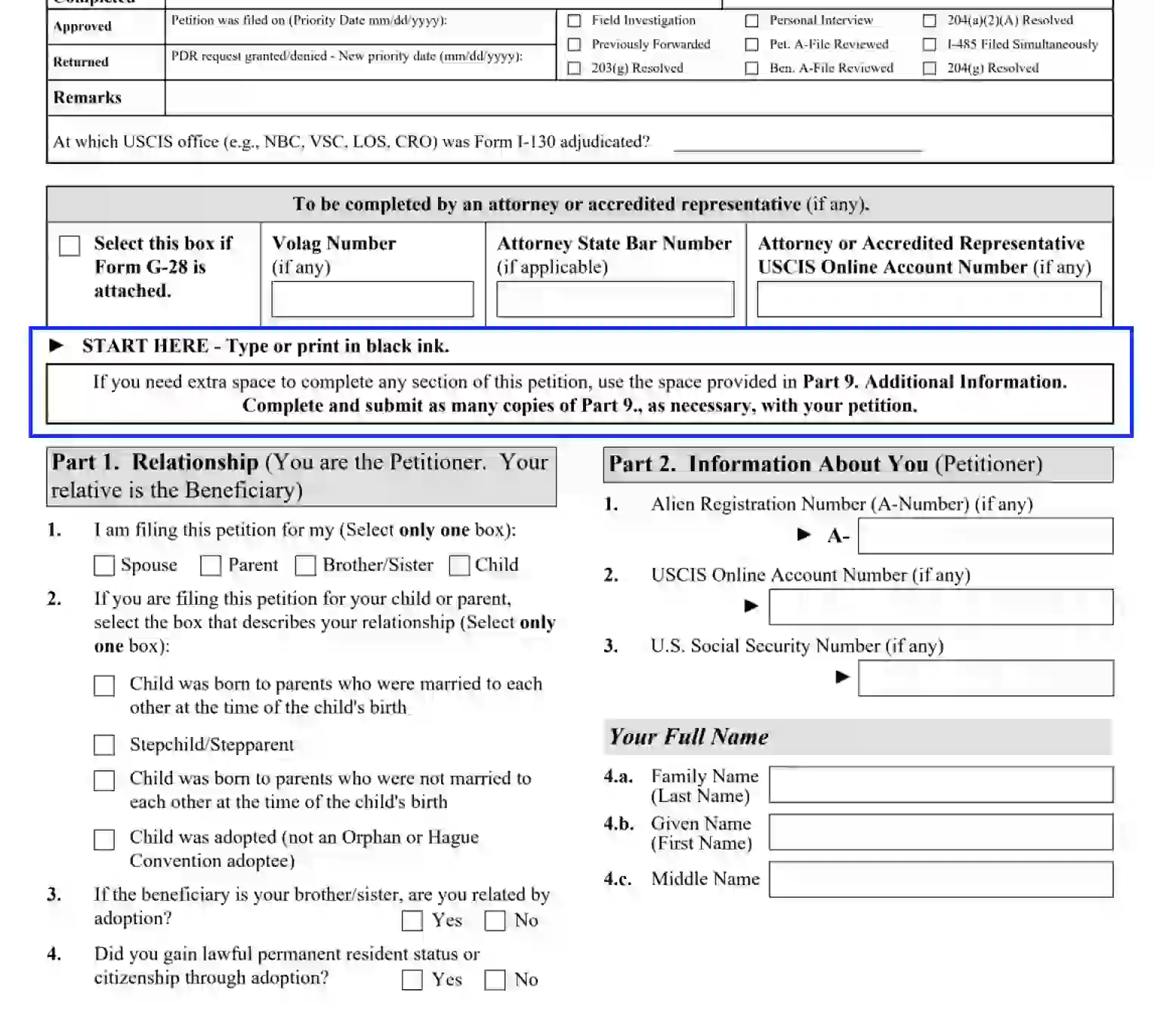
You will find extra space in Part 9 that might be useful while completing some units of the I-130 template. The section appears to be the last page of the document.

- Complete the Relationship Part
Specify your relationship with the beneficiary and select the appropriate variant among the given alternatives. Answer the four questions stated in this part.
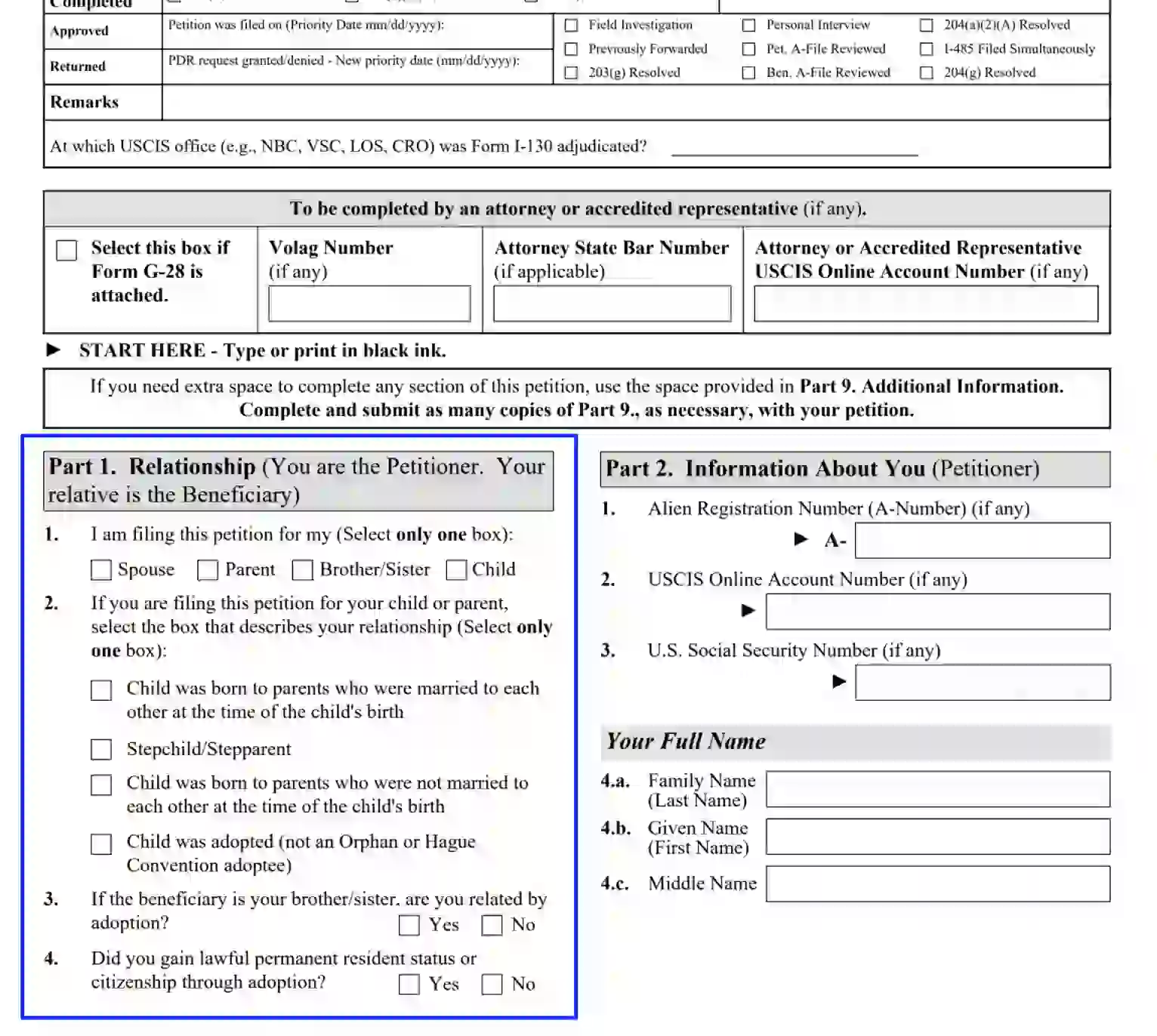
- Enter the Petitioner’s Info
Part 2 covers the petitioner’s personal data. The section starts on page one and extends to page four of the respected I-130 paperwork. To correctly execute this section, the petitioner should submit these data:
- Alien Registration Number
- USCIS account Number
- SSN of the US citizen
Please, note that this specific information might be absent. Apply the data if it is applicable.
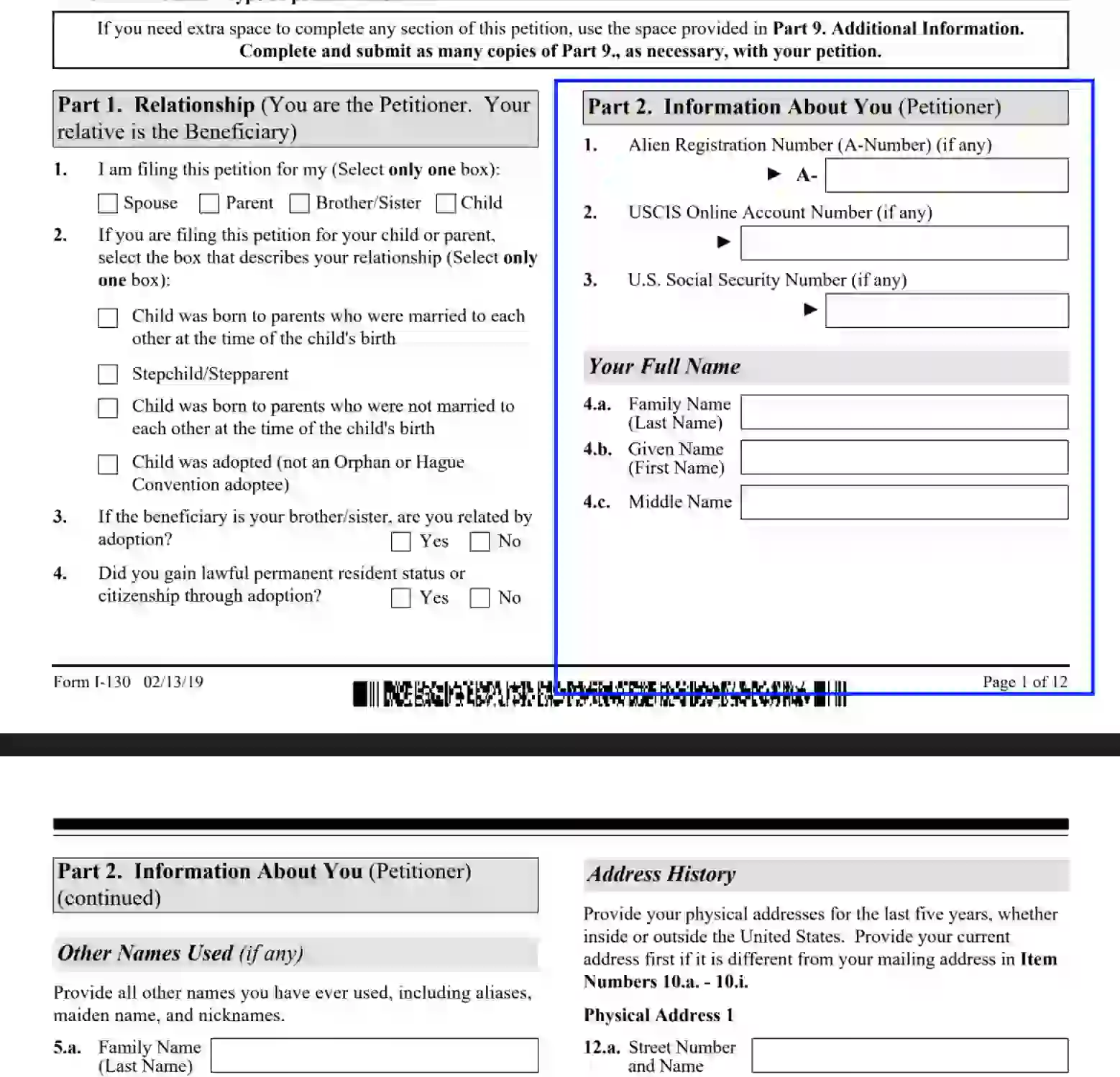
The upcoming sections require personal information about the petitioner’s identity and contacts. Please include the following:
- Full legal name, including last, first, and middle initials
- Names the petitioner used to have, including maiden name, nicknames, and other related data.
- Birth data
Here, one should specify the date and place of birth and indicate the sex. Select one of the alternatives.
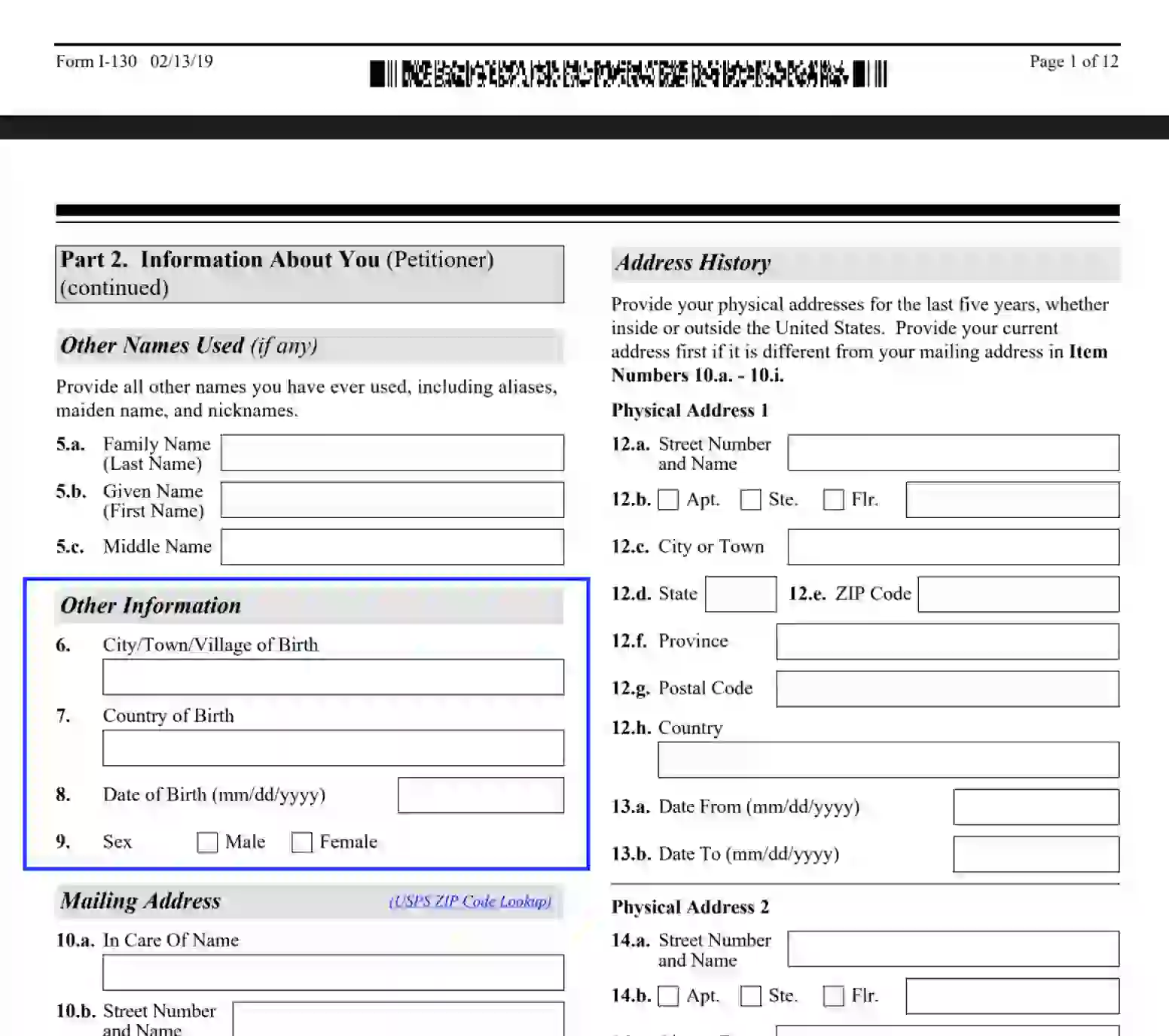
- Full mailing and physical address
Make sure you accommodate the requirement and provide relevant mailing and physical addresses. If your physical place of residency differs from your mailing domiciliary location, include appropriate info in questions 12.a-13.b of the Part 3 section.

- The Petitioner’s address background
Here you should specify the domiciliary history for the last five years. Make sure to include the residences both inside and outside the US. You are empowered to enter your physical location first if it differs from the mailing one. The template offers a place for two locations, however.
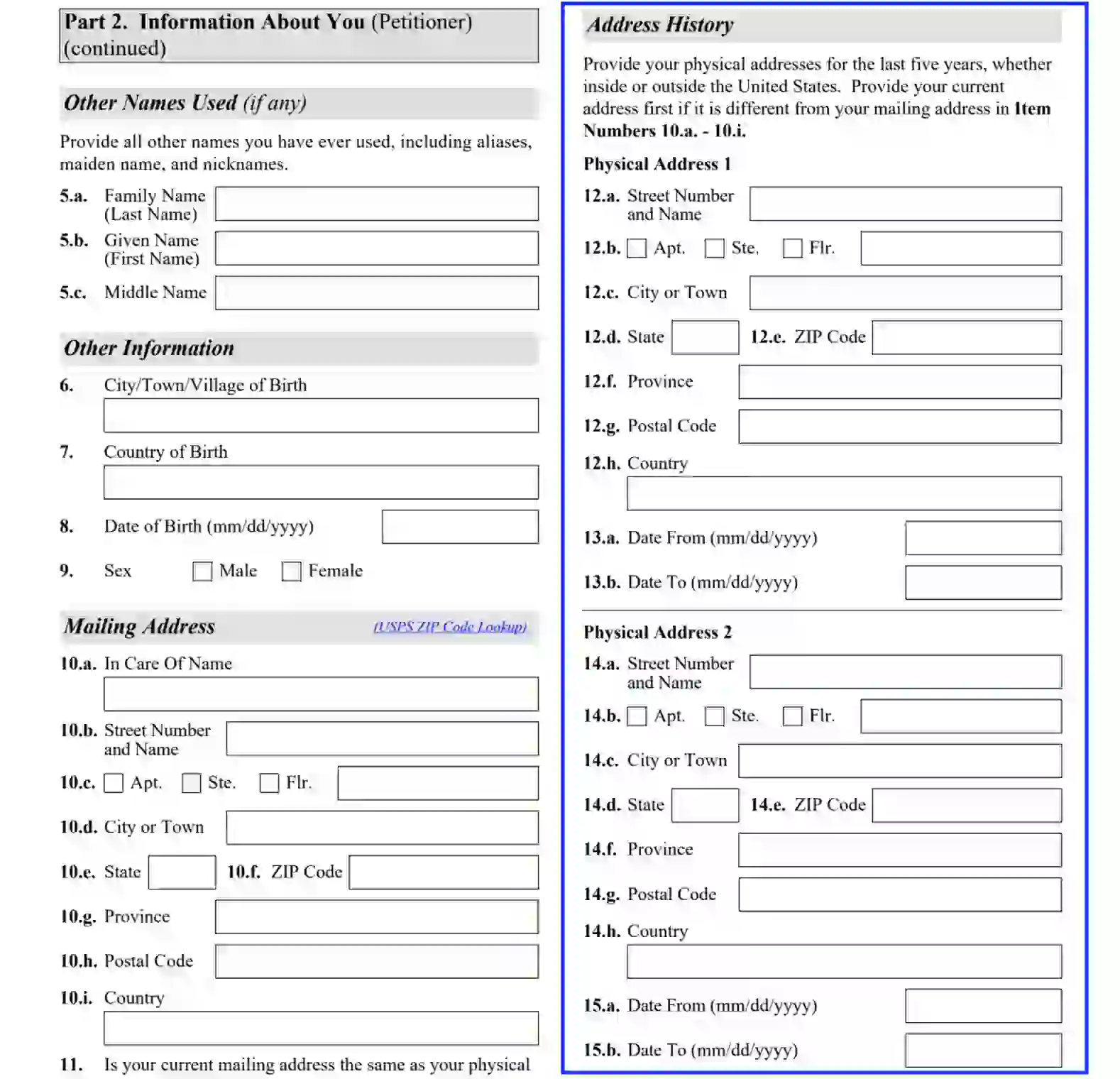
- Marital status
The I-130 form suggests that the petitioner fills out the marital status data and, in case they are married, the marriage location and the spouse’s personal info. There are alternatives to complete the data about the current and the previous spouses if there has been more than one marriage.

- Parents’ info
The petitioner is welcome to enter their parents’ personal data. Use the corresponding slots to accomplish the section.
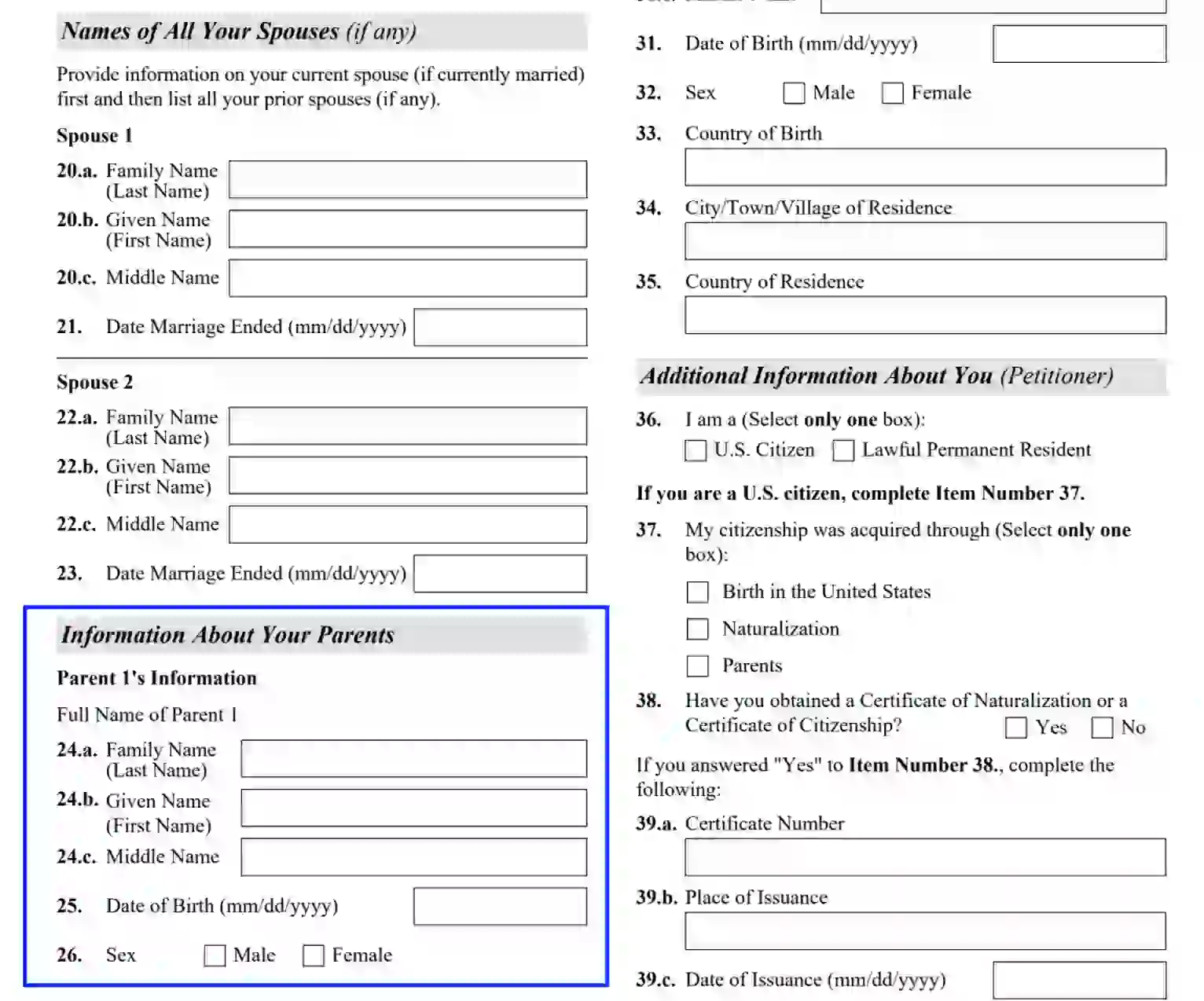
- The petitioner’s additional personal info
Complete the data about your citizenship and naturalization (if applicable). The section starts on page three and continues on page four, covering questions 36-41.
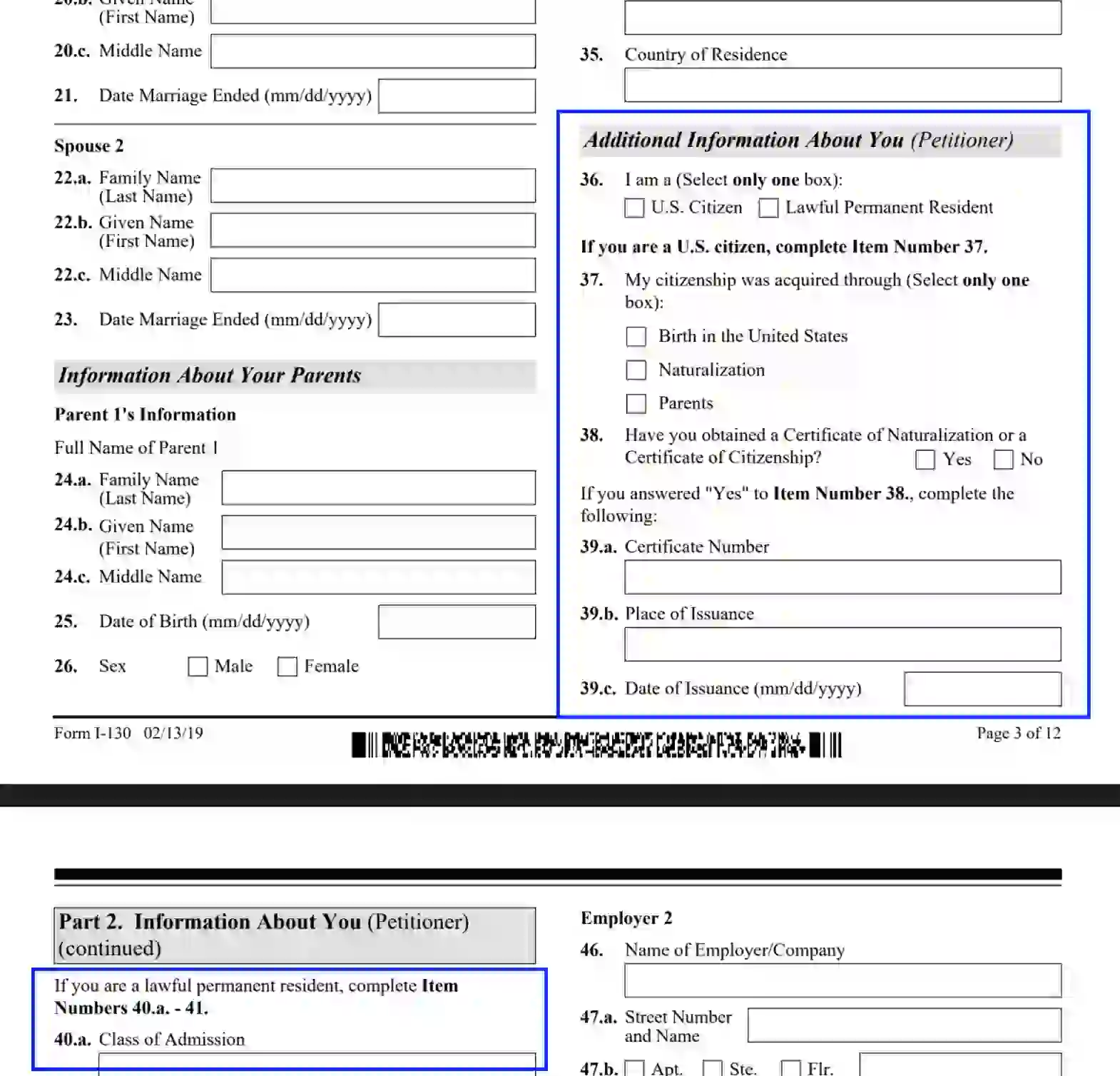
- Job Background
This section requires that the petitioner enters relevant data about their working background, starting with the current employment. Suppose you are not engaged in any business activity at the moment. Please, answer “unemployed” to question 42. The Employment section covers questions 42-49.b.
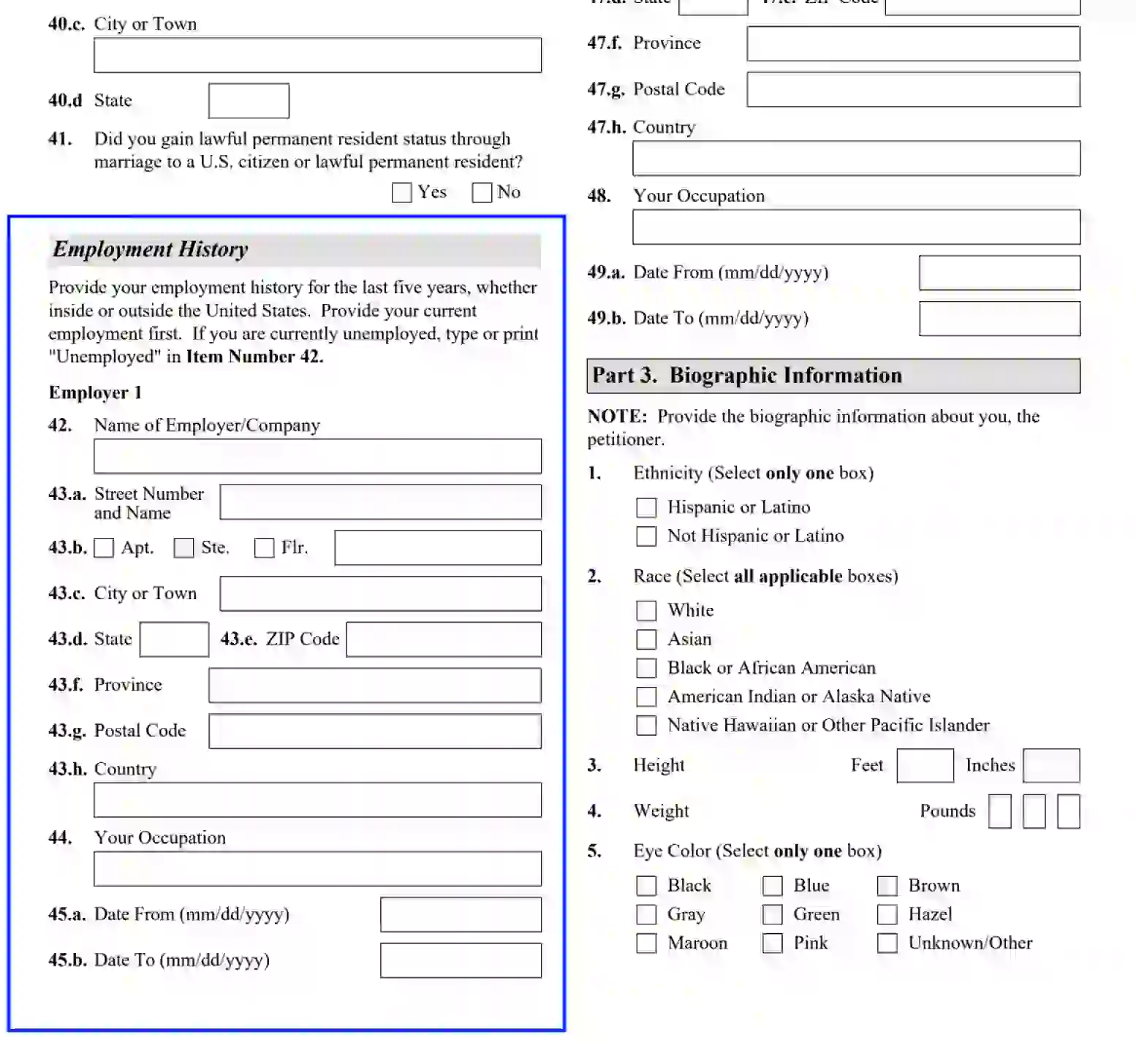
- Provide Data About the Petitioner’s Biography
You should specify the petitioner’s ethnicity, race, height, weight, eye, and hair color in Part 3. Every subsection provides several alternatives. You should select the relevant one to describe your biographic appearance.
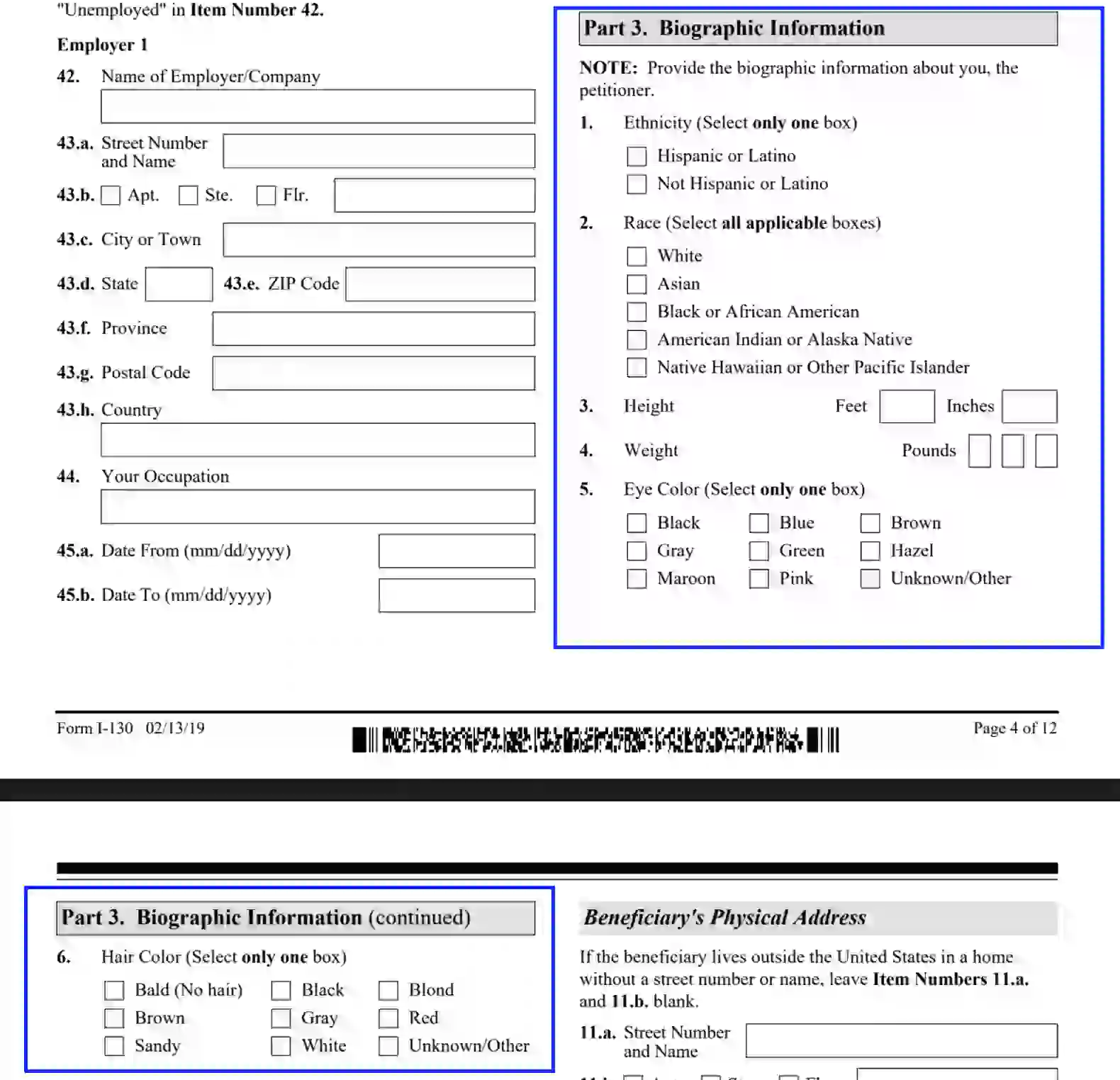
- Collect the Beneficiary’s Personal Data
Part 4 is dedicated to the beneficiary you are applying the I-130 form for. It comprises several pages and includes questions 1-62.c. The info required is similar to the petitioner’s directives and covers the following questions:
- Alien Registration, USCIS account, and SSN numbers
- Legal and other names
- Birth info and sex
Pay attention to question 10 and render the needed info following the requirements of the form.
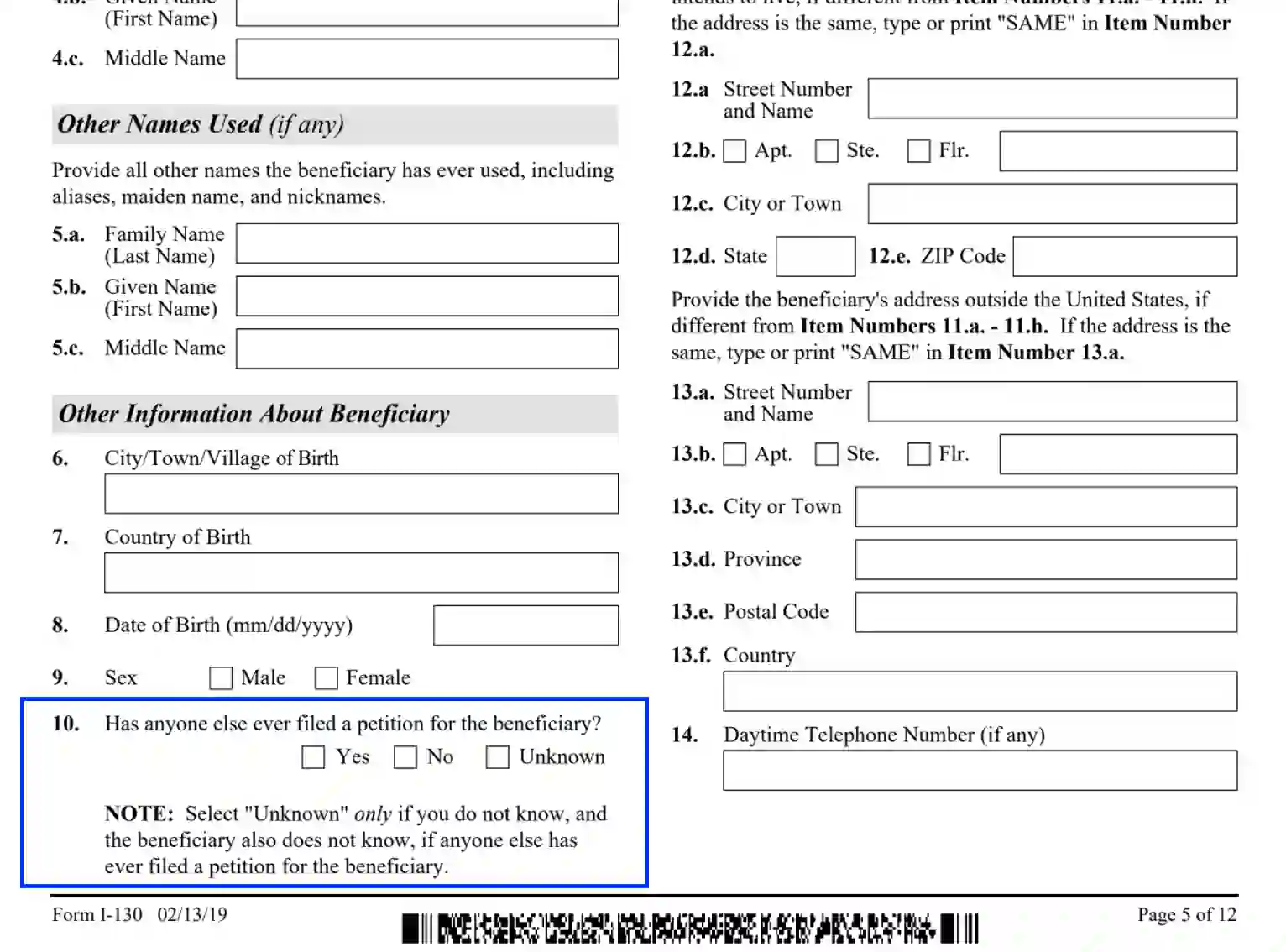
- Physical address and contact data
- Marital status, spouse’s info, and family information, including the beneficiary’s children
- Entry info
If the person you favor has ever visited the US, include these data. Follow the directions of questions 45-50 and submit the demanded documents.
- Employment background
- Immigration proceedings data
The subsection contains questions 53-56.
- Submit the Beneficiary’s Name in Their Native Language
There might be cases when the beneficiary’s native language differs immensely from American English and doesn’t contain Roman letters. Therefore, use this subsection to indicate the beneficiary’s name and residency in the native language.
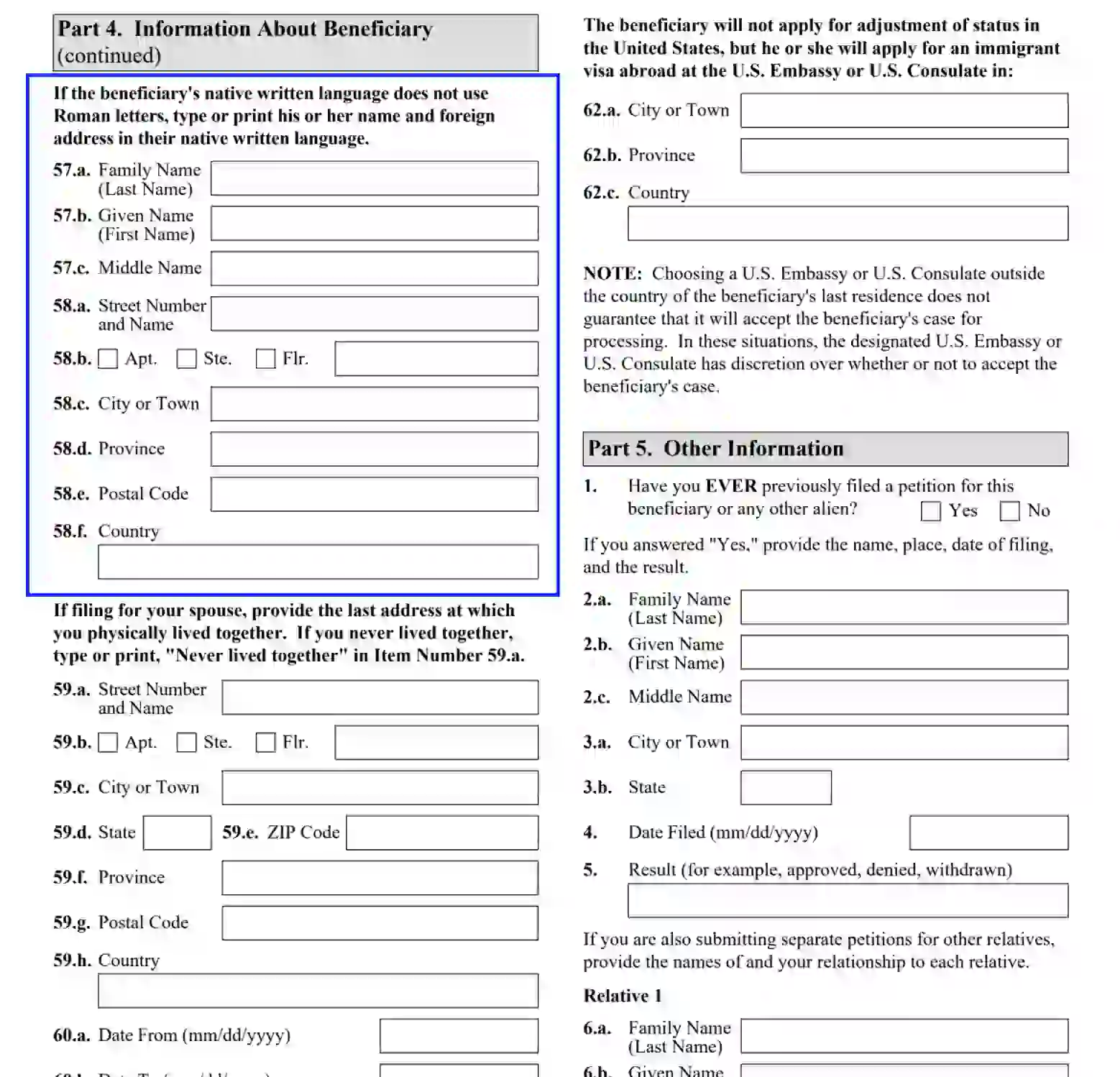
- Provide the Marital Living Address
If you, as the petitioner, file the application for your spouse, indicate whether you have lived together and where. Provide the location’s details in the appropriate slots. Should you never share a living unit, please confirm “Never lived together” in the 59.a. slot.

- Specify the US Embassy or Consulate
Should the beneficiary resign in the US and apply within the state, please, designate the appropriate embassy and specify the city and the state where the person will apply for the immigrant visa.
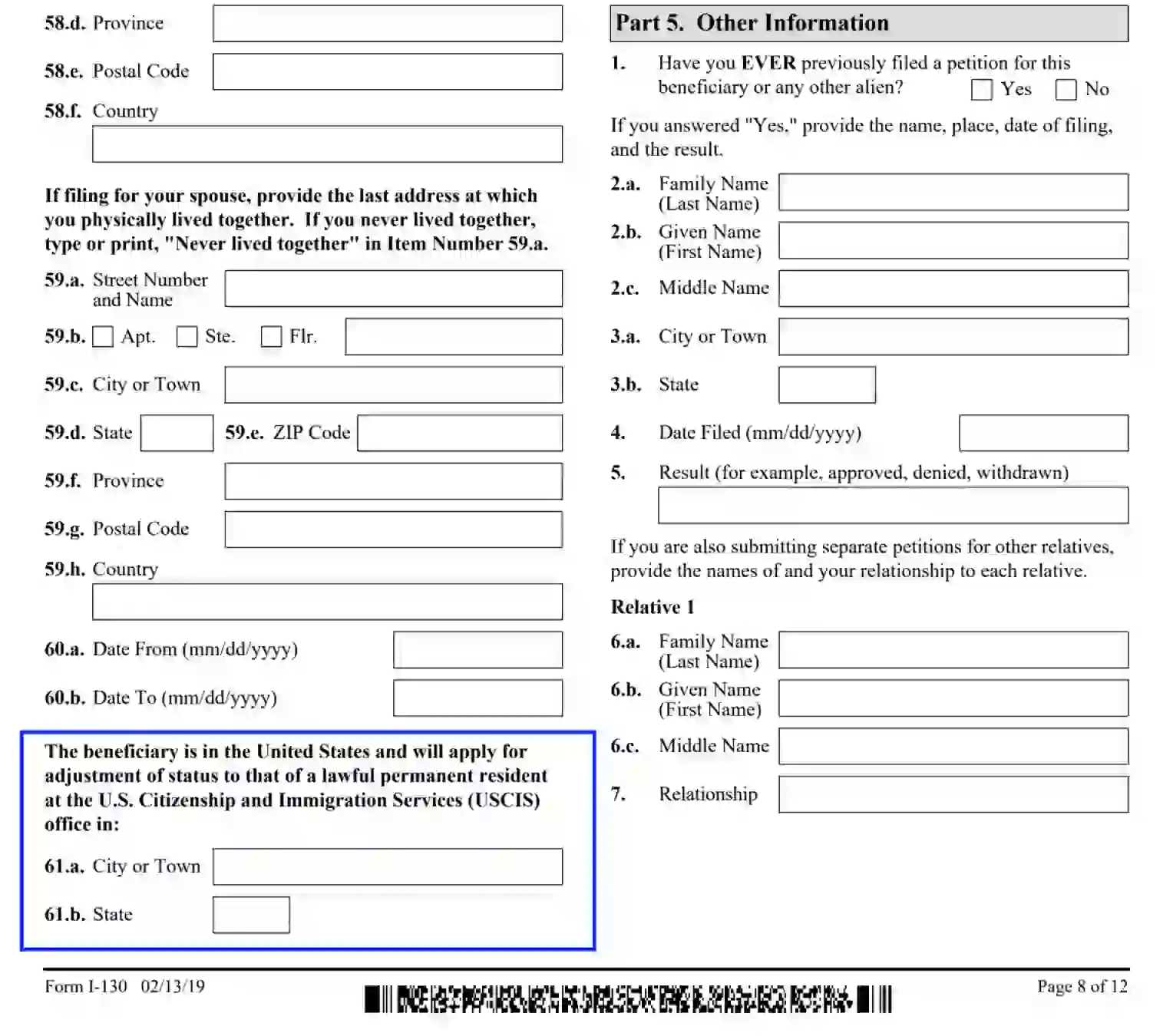
Suppose the beneficiary will apply for the immigrant visa in an out-of-state Embassy or Consulate. Designate the city, province, and country to apply for and collect the documents.
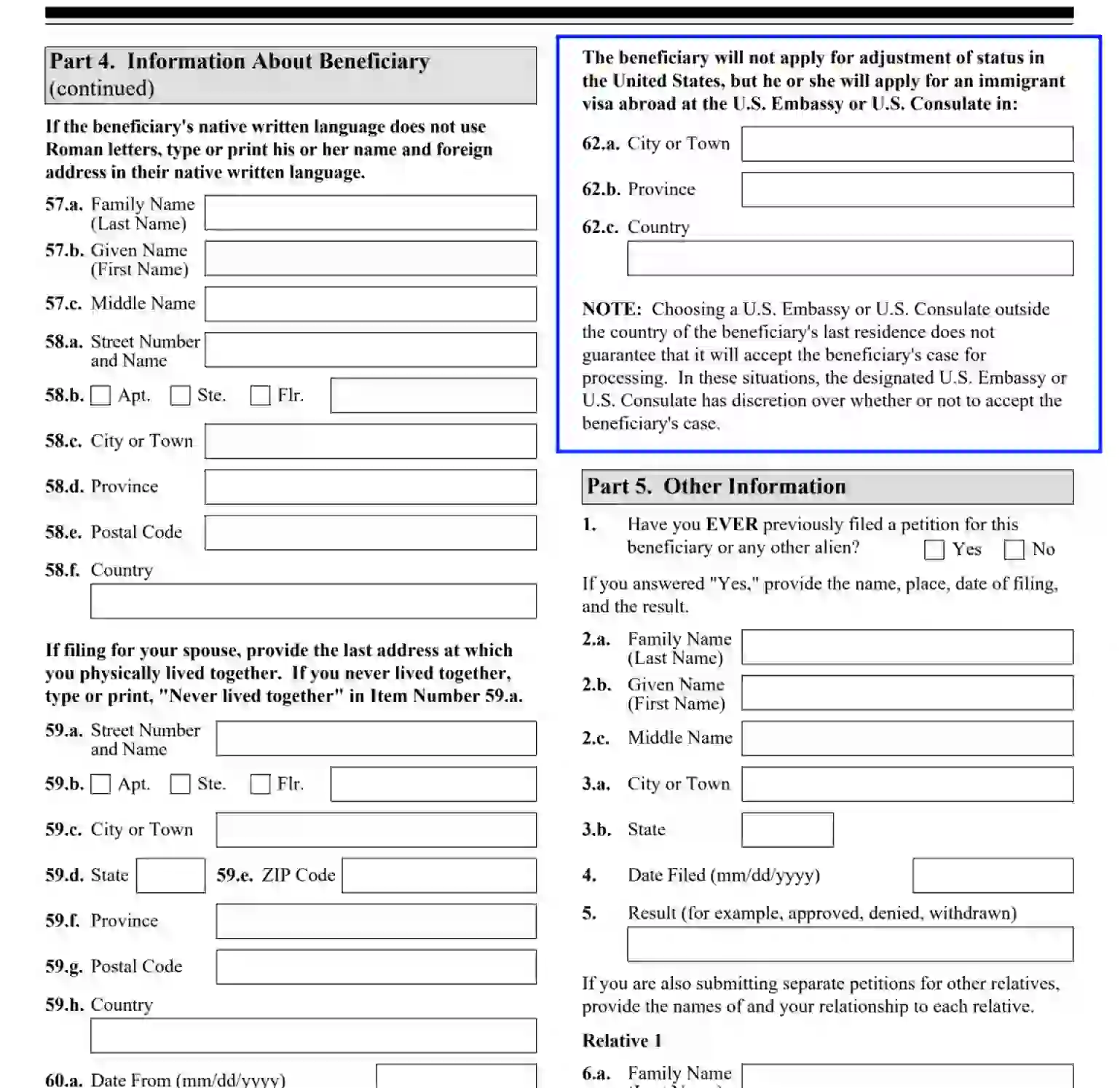
- Submit Information About Other Cases of I-130 Petitions (If Any)
Part 5 of the respected document reveals other cases when the petitioner files a petition for alien relatives. If this is your case, make sure to provide the necessary data about any matters in the past or running currently. Complete the section if applicable.
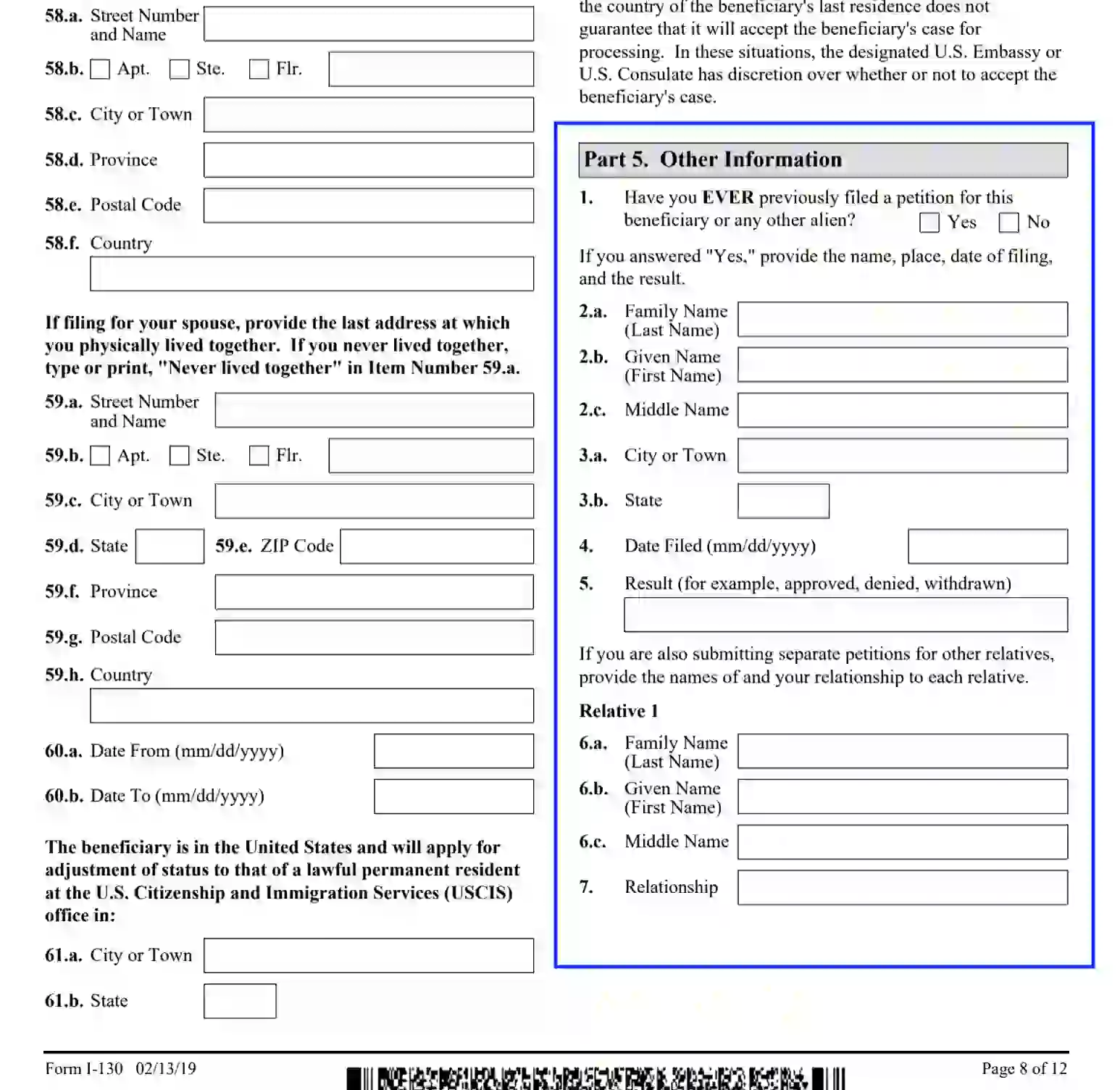
The section starts on page eight and continues on page nine. Consider the warning paragraph seriously because the penalties for submitting false data are severe.
- Complete the Petitioner’s Statement Part
This part starts with the Statement Section, where you should indicate whether you have read and prepared the document yourself or turned to an interpreter for translation and assistance. Select the appropriate variant.
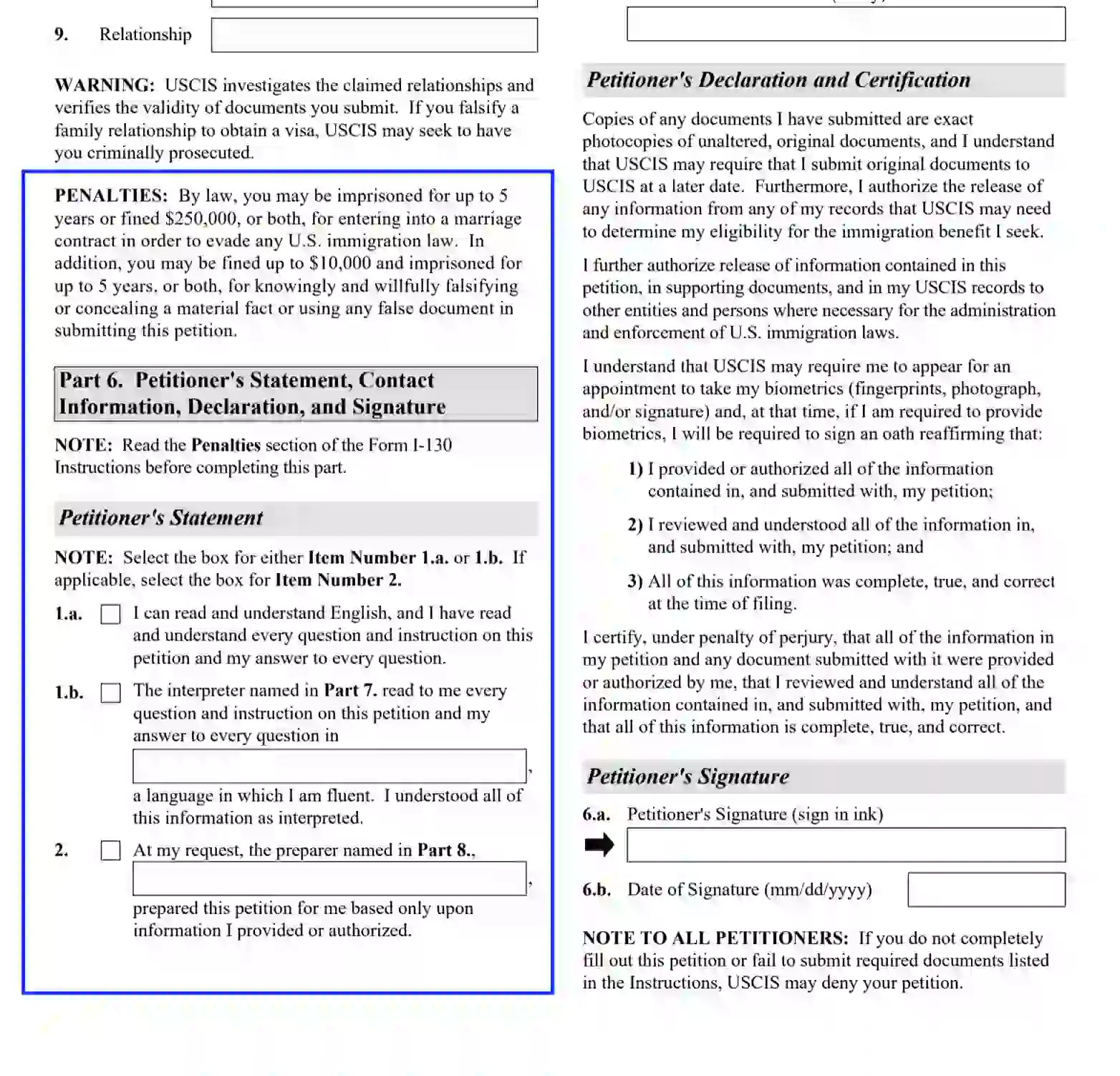 If you require the assistance of an interpreter, you should complete Part 7 of the I-130 Form and collect the following:
If you require the assistance of an interpreter, you should complete Part 7 of the I-130 Form and collect the following:
- The interpreter’s full name and domiciliary location
- Contact info
- The interpreter’s acknowledgment, including the certification and signature
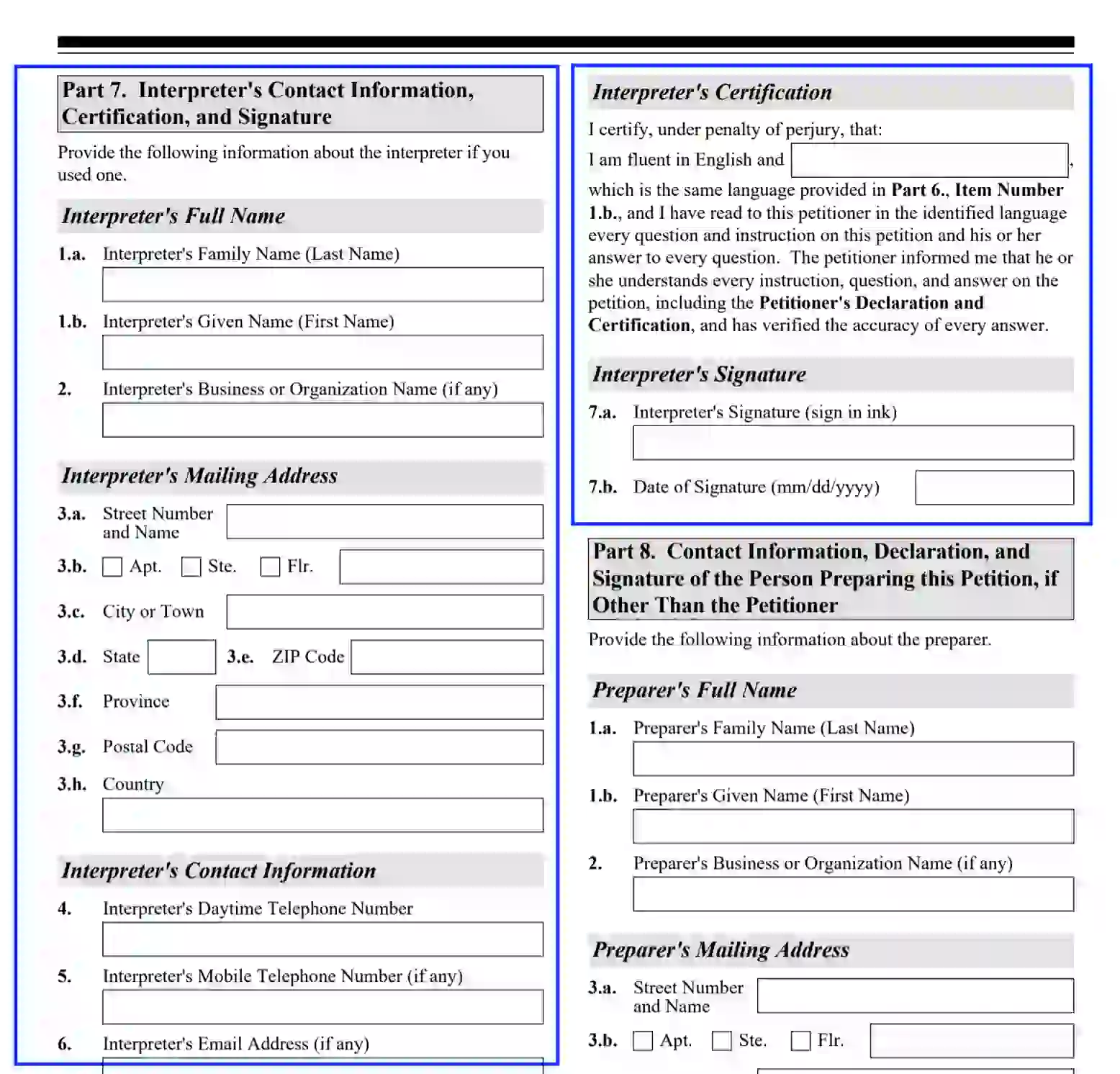
If you ask someone else to prepare the Petition for you, make sure to provide the preparer’s necessary data in Part 8. You need to enter their legal name, address, contact data, and collect their statement, certification, and signature acknowledgment. The section covers pages 10-11.
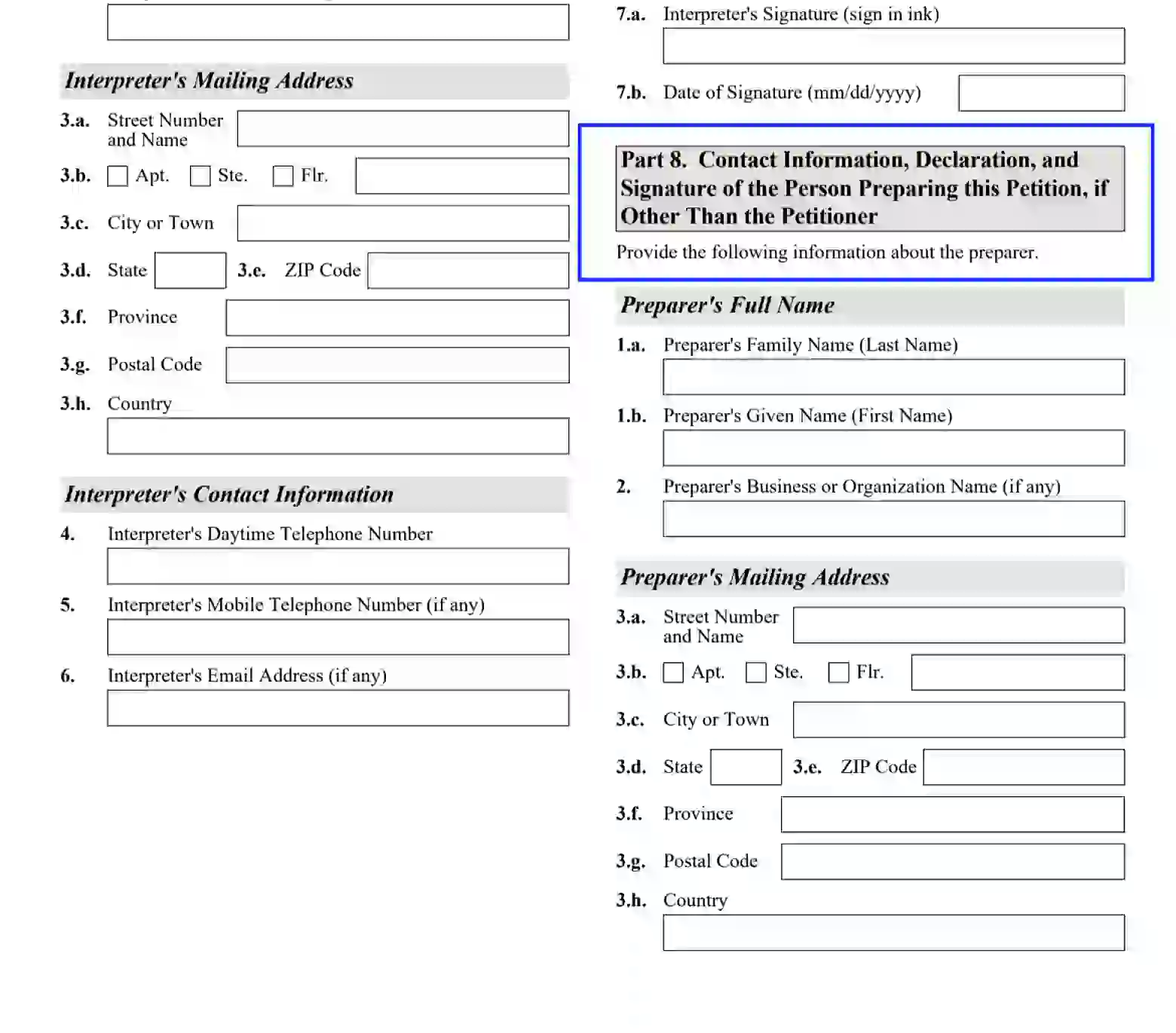
- Provide Your Contacts
After you have specified the statement details, proceed to the Contacts paragraph. Include actual phone numbers and an email address.
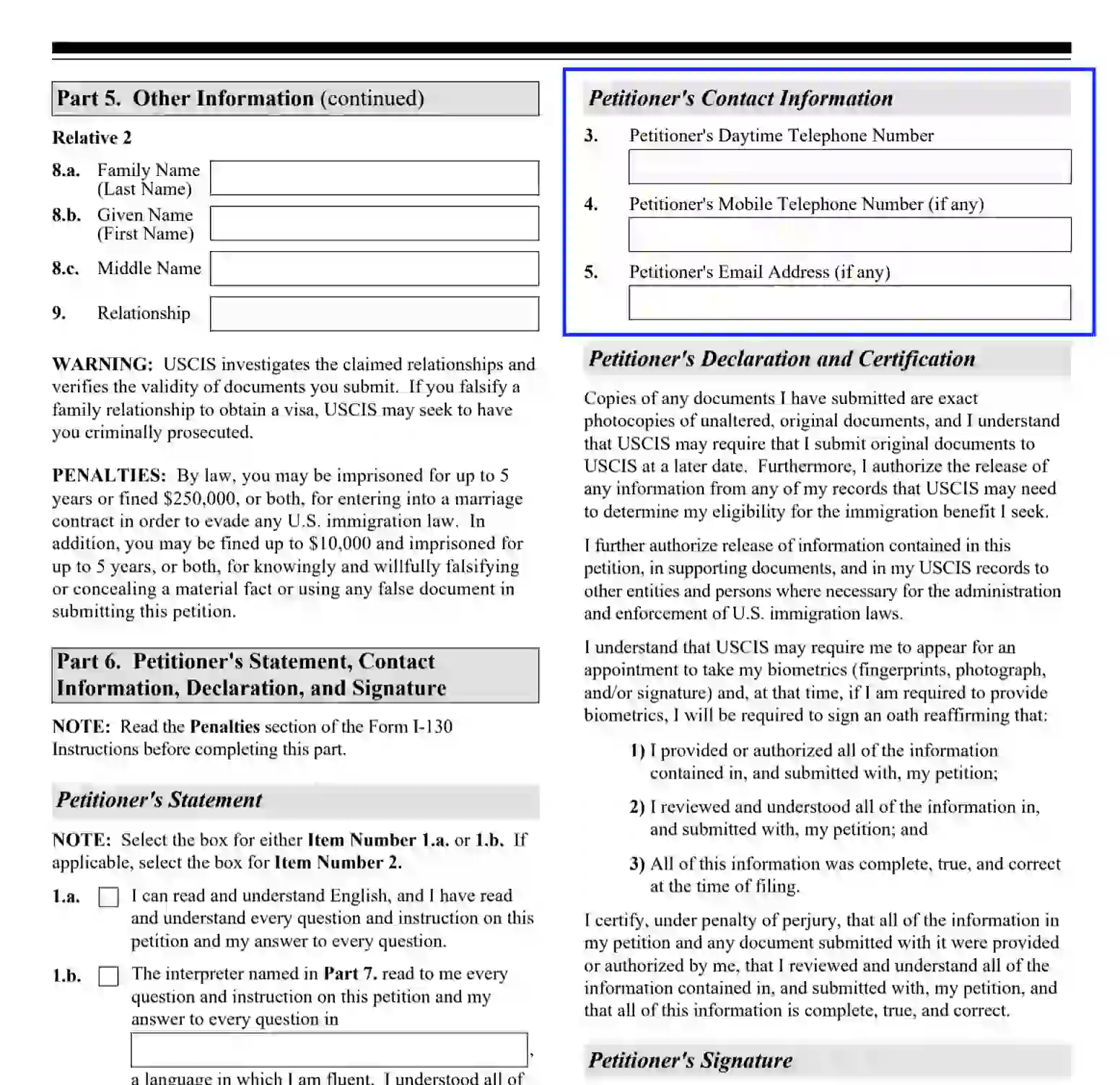
- Read the Declaration Section and Sign the Petition
Prior to appending your signature, read the declaration attentively, and check all the submitted data to avoid mistakes and false statements. By signing the paperwork, the petitioner confirms their consent to the info provided.

